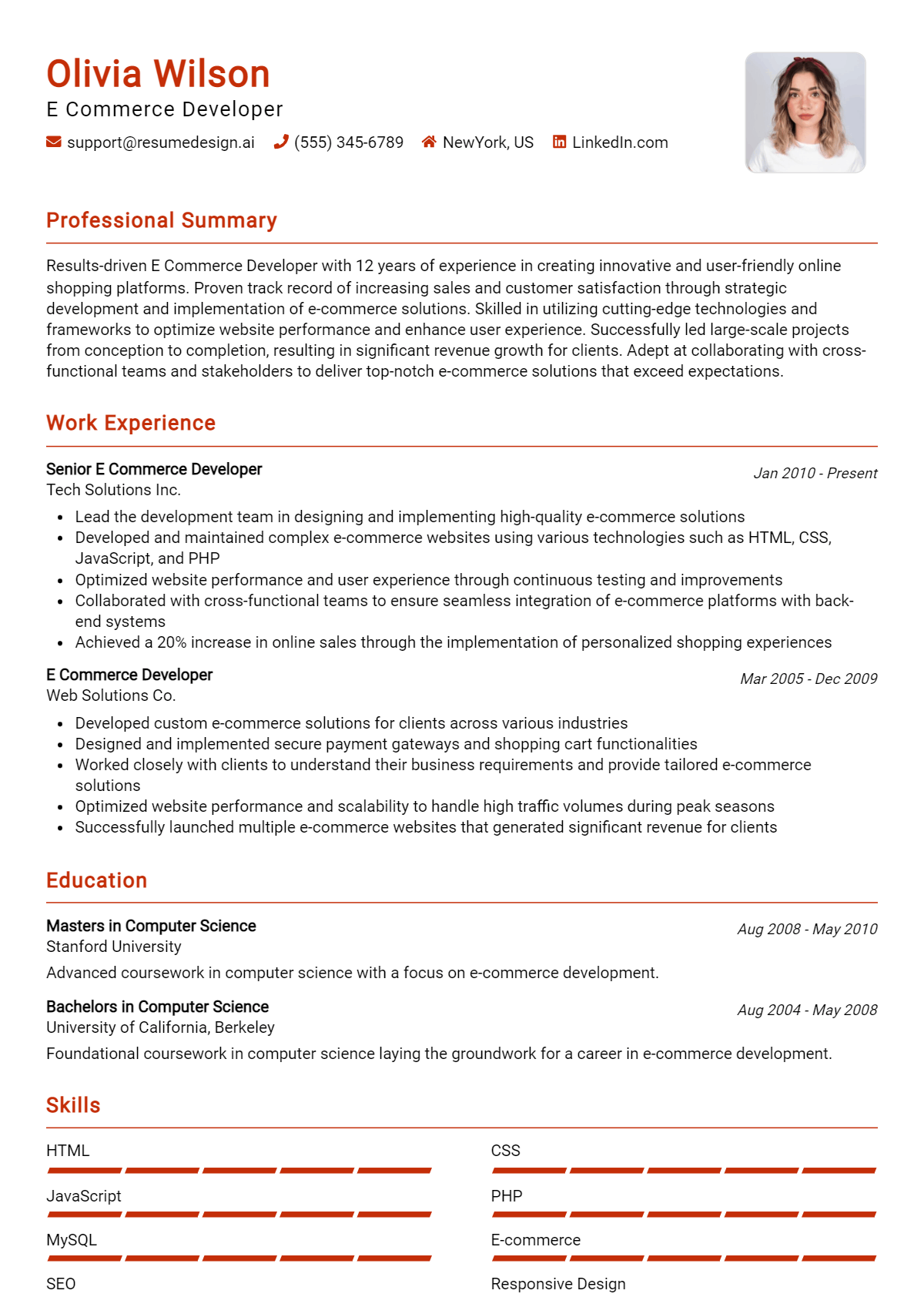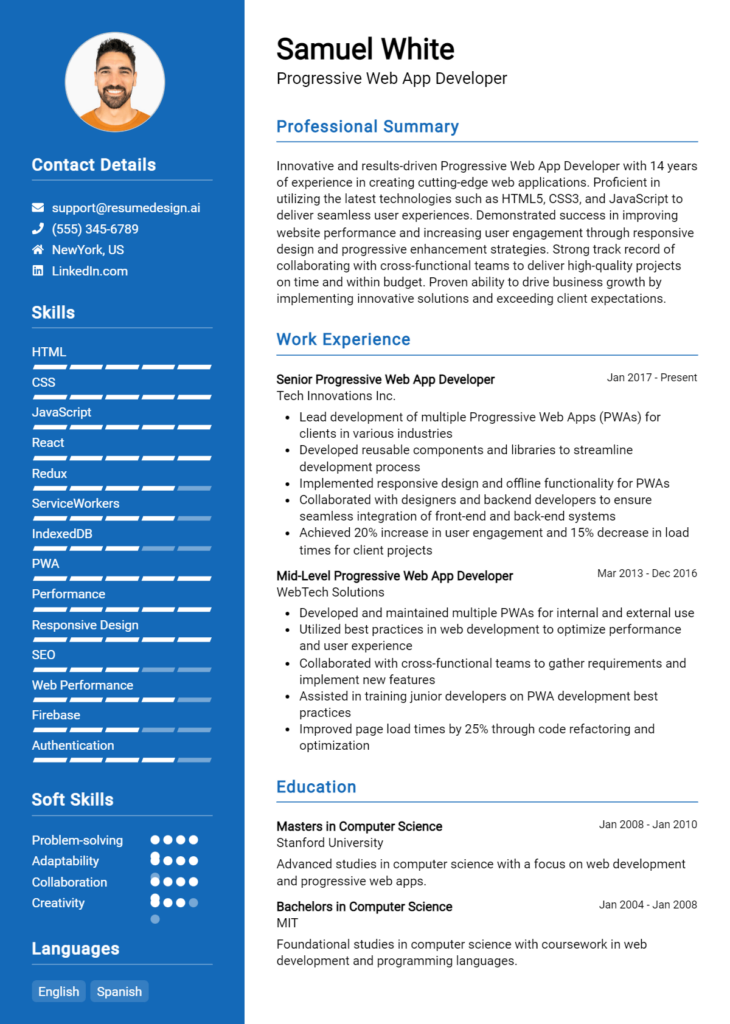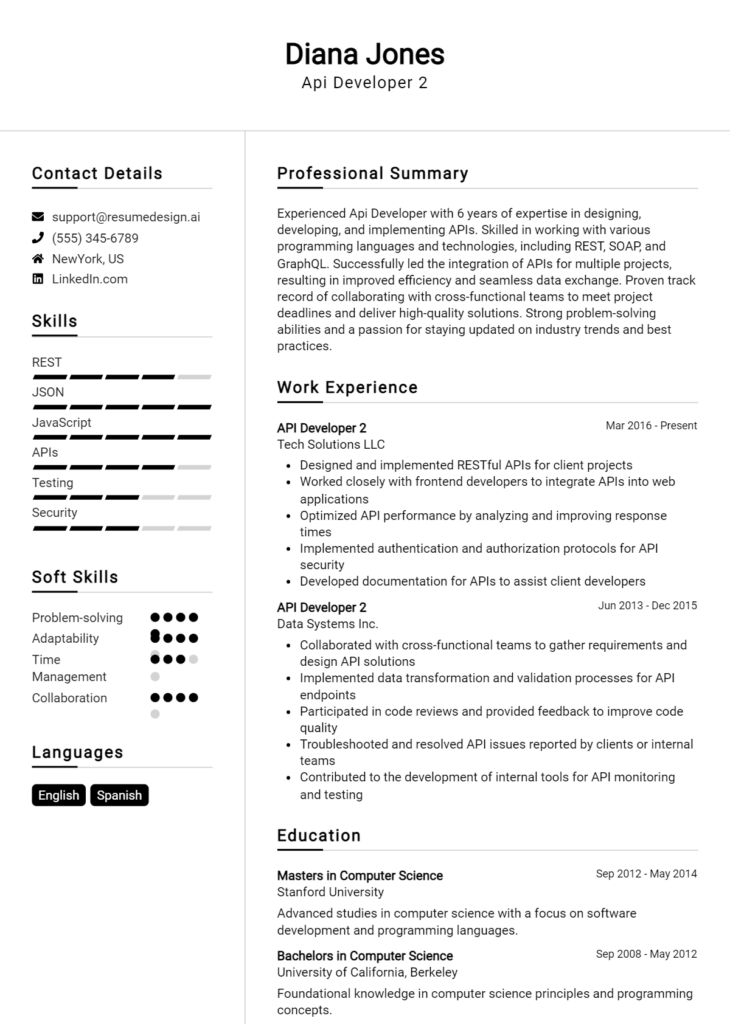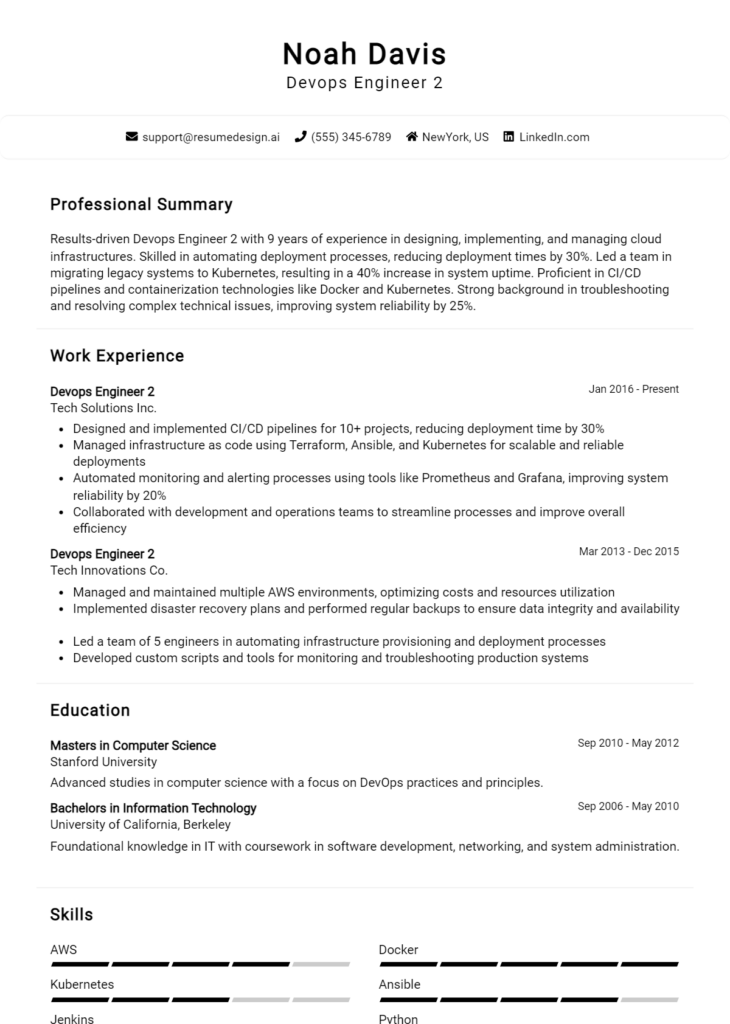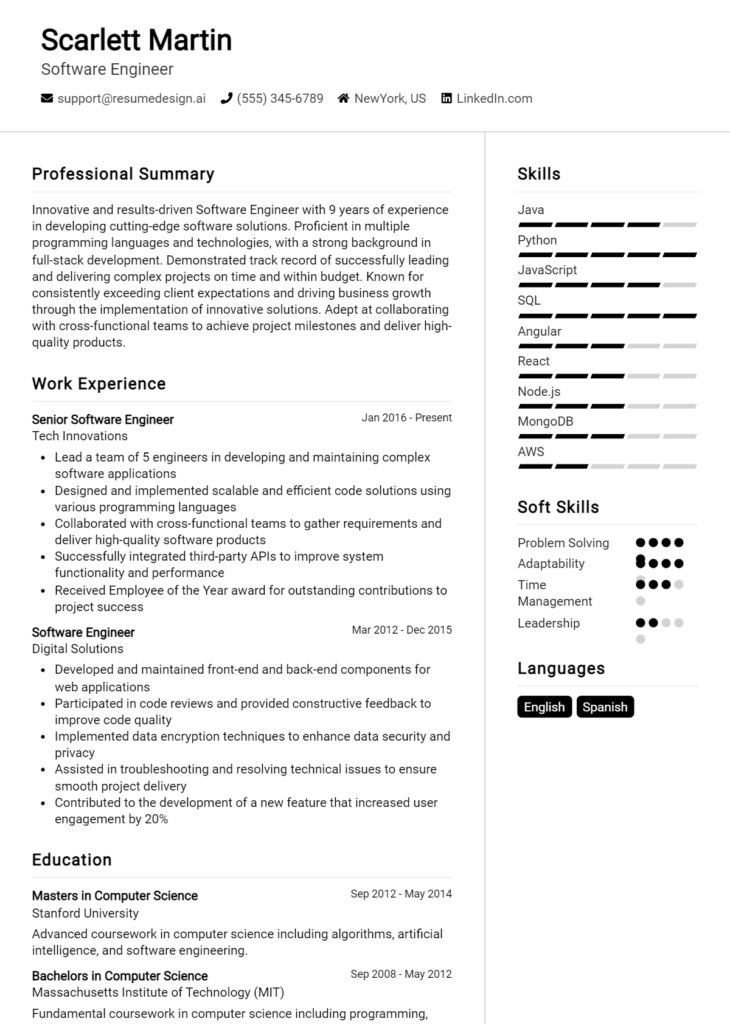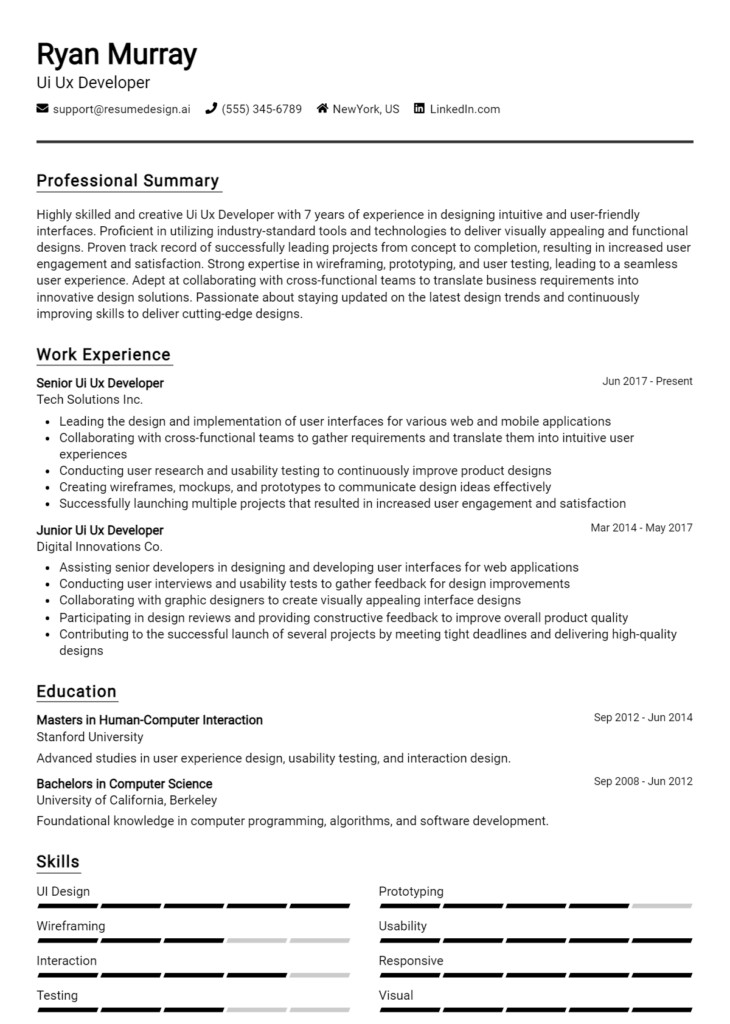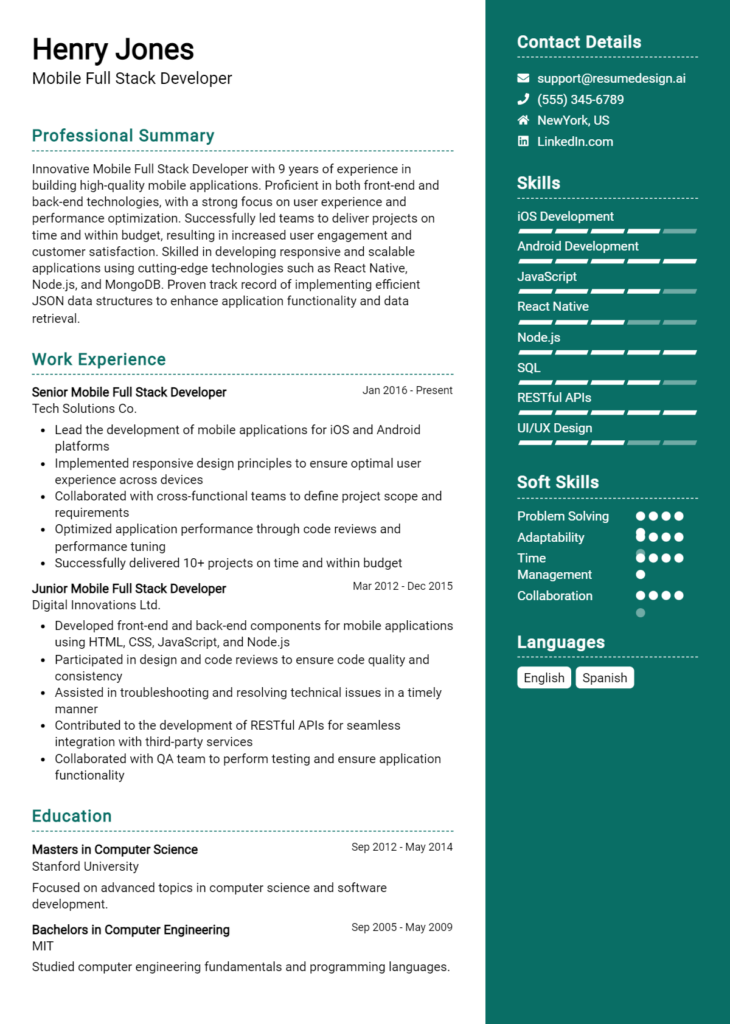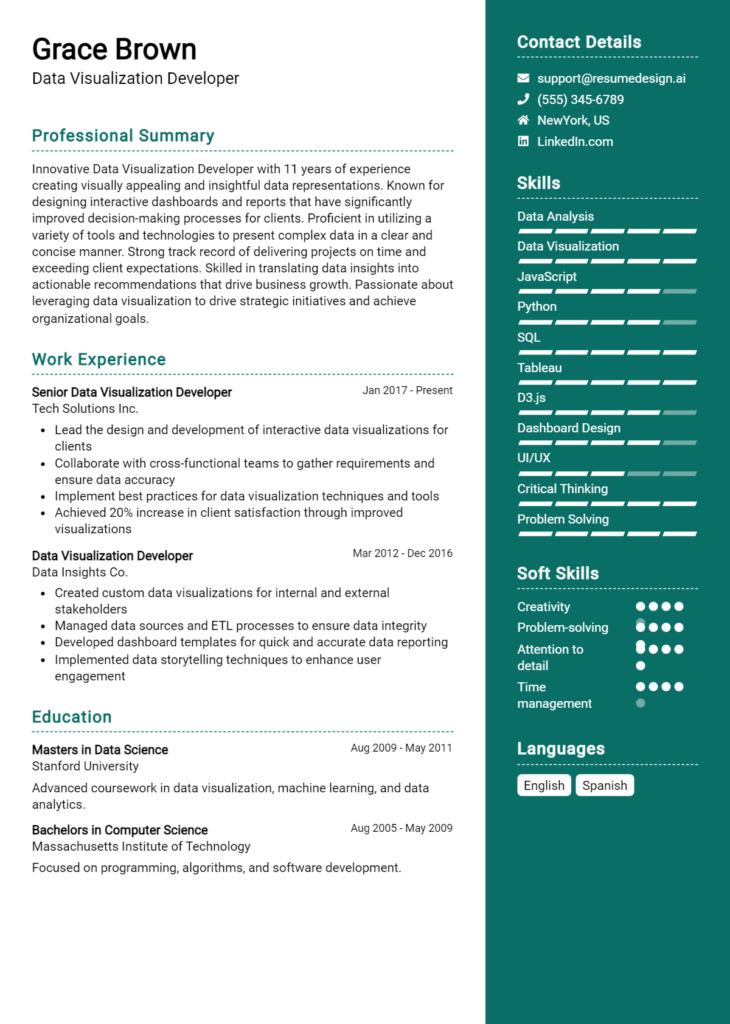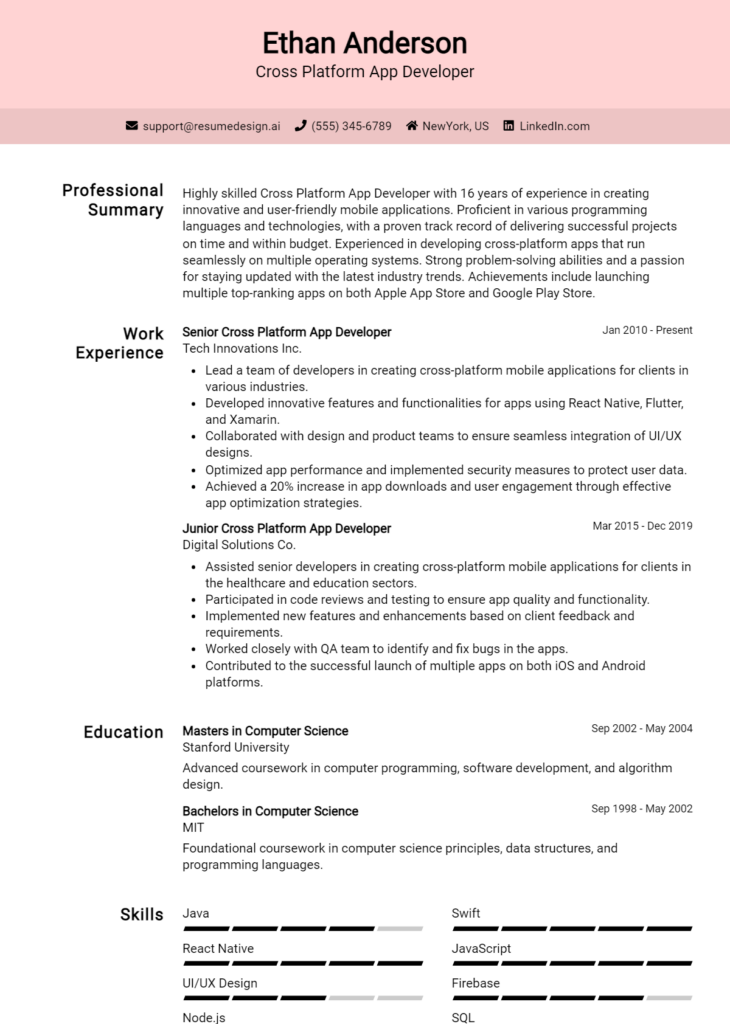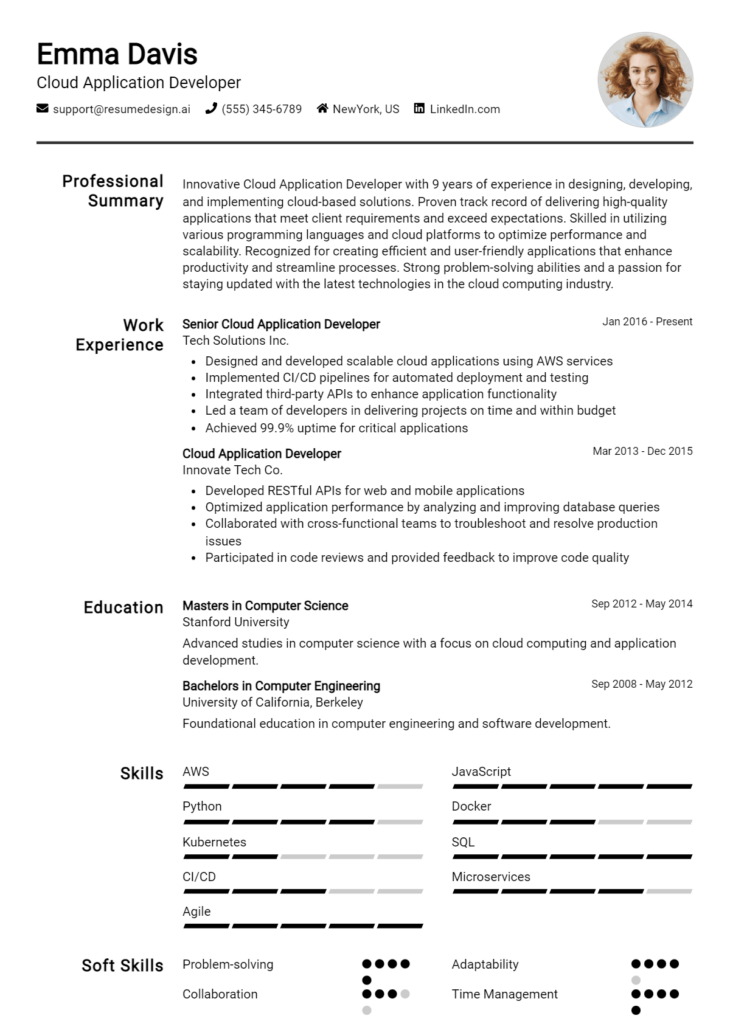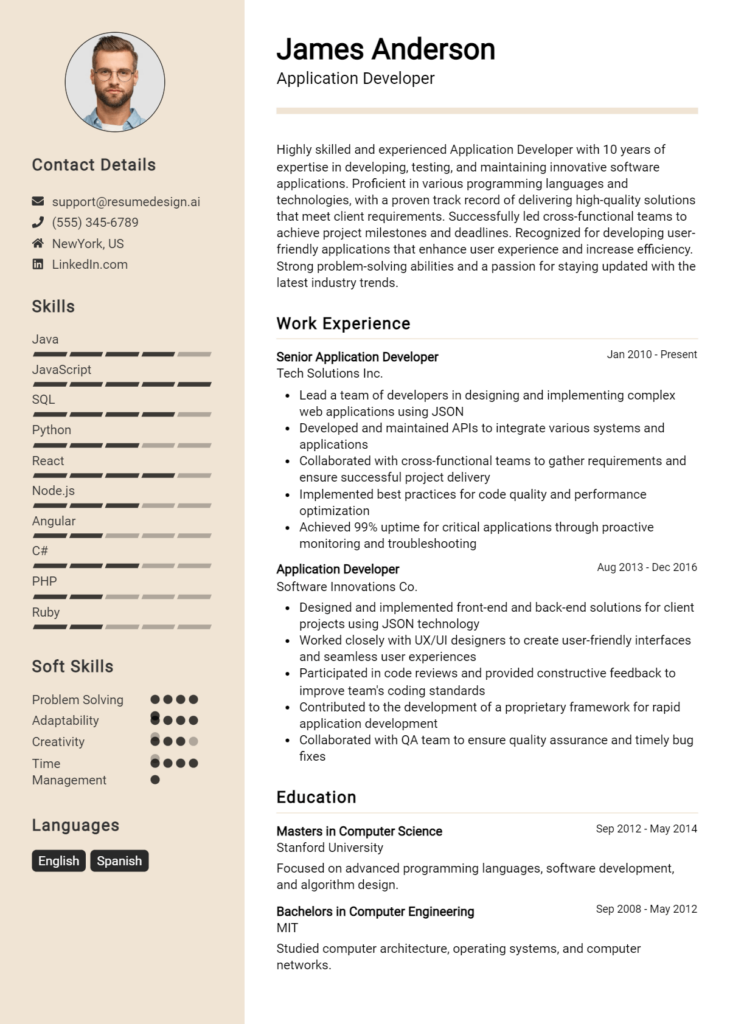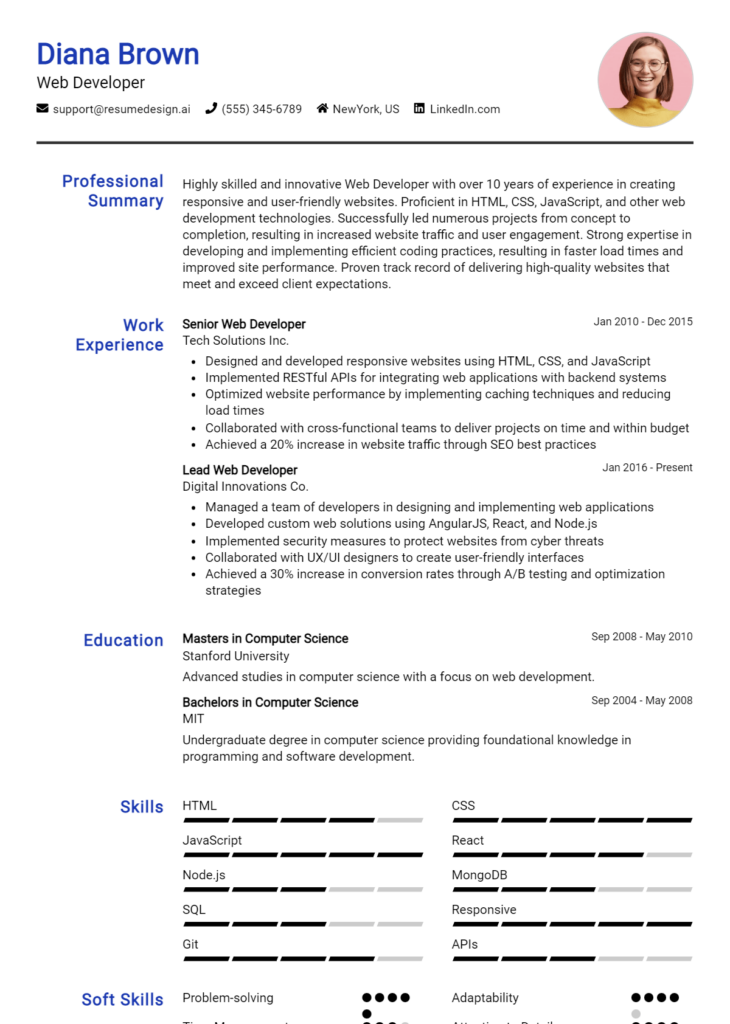E-commerce Developer Core Responsibilities
An E-commerce Developer plays a vital role in bridging technical, operational, and business functions within an organization. Core responsibilities include designing and maintaining online stores, integrating payment gateways, and optimizing user experience. They must possess strong programming skills, a keen understanding of digital marketing, and the ability to troubleshoot issues efficiently. These technical and problem-solving skills are crucial for achieving organizational goals, and a well-structured resume can effectively highlight these qualifications, ensuring candidates stand out in a competitive job market.
Common Responsibilities Listed on E-commerce Developer Resume
- Develop and maintain e-commerce websites and applications.
- Integrate payment processing systems and APIs.
- Optimize website performance and user experience.
- Collaborate with design and marketing teams for cohesive branding.
- Implement SEO best practices to enhance visibility.
- Perform regular updates and maintenance of e-commerce platforms.
- Analyze website analytics to drive improvements.
- Ensure compliance with security standards and data protection regulations.
- Provide technical support and troubleshooting for e-commerce issues.
- Test and validate new features and updates before deployment.
- Manage product listings and inventory on the platform.
- Stay informed about industry trends and emerging technologies.
High-Level Resume Tips for E-commerce Developer Professionals
In the competitive landscape of e-commerce development, a well-crafted resume is crucial for standing out among a sea of candidates. As the first impression a potential employer has of you, your resume needs to effectively showcase not only your technical skills and relevant experiences but also your achievements in the field. A resume that reflects your unique qualifications can open doors to exciting opportunities and demonstrate your value to prospective employers. This guide will provide practical and actionable resume tips specifically tailored for E-commerce Developer professionals, ensuring you present yourself in the best possible light.
Top Resume Tips for E-commerce Developer Professionals
- Tailor your resume to each job description by incorporating relevant keywords and phrases that match the specific requirements of the position.
- Highlight your technical skills prominently, focusing on languages and frameworks commonly used in e-commerce, such as HTML, CSS, JavaScript, and platforms like Shopify or Magento.
- Showcase relevant work experience, emphasizing projects that demonstrate your ability to build and optimize e-commerce websites.
- Quantify your achievements with specific metrics, such as increased conversion rates, reduced load times, or improved user experience scores.
- Include a dedicated section for certifications and ongoing education related to e-commerce technologies and best practices.
- Utilize a clean, professional format that enhances readability, making it easy for hiring managers to navigate through your qualifications.
- Incorporate links to a portfolio or GitHub repository showcasing your previous work, providing tangible evidence of your skills.
- Emphasize soft skills such as problem-solving, teamwork, and communication, which are essential for collaborating with cross-functional teams in e-commerce projects.
- Keep your resume concise, ideally one page, focusing on the most relevant information to maintain the reader's attention.
- Include a personal statement or summary at the top that succinctly captures your career goals and what you bring to the role as an E-commerce Developer.
By implementing these tips, you can significantly enhance your resume and increase your chances of landing a job in the e-commerce development field. A polished and targeted resume not only showcases your qualifications but also demonstrates your understanding of the industry's demands, setting you apart as a strong candidate in a competitive job market.
Why Resume Headlines & Titles are Important for E-commerce Developer
In the competitive landscape of e-commerce, the role of an E-commerce Developer is pivotal in creating seamless online shopping experiences. A well-crafted resume headline or title serves as the first impression a hiring manager has of a candidate, encapsulating their key qualifications in a concise and impactful manner. An effective headline should succinctly convey the candidate’s core competencies, relevant experience, and unique value proposition, allowing it to stand out in a sea of applications. By doing so, it not only grabs the attention of prospective employers but also sets the stage for a compelling resume that reflects the candidate’s fit for the role.
Best Practices for Crafting Resume Headlines for E-commerce Developer
- Keep it concise: Aim for a headline that is no longer than a single line.
- Be role-specific: Tailor your headline to reflect the specific e-commerce developer position you are applying for.
- Highlight key skills: Mention relevant technologies or methodologies that showcase your expertise.
- Incorporate metrics: If possible, include quantifiable achievements to demonstrate impact.
- Use industry keywords: Incorporate terms commonly used in the e-commerce field to enhance visibility.
- Showcase unique value: Highlight what sets you apart from other candidates, such as specific certifications or niche expertise.
- Avoid jargon: Use clear and straightforward language to ensure your headline is easily understood.
- Revise for relevance: Tailor your headline for each application to align with the job description.
Example Resume Headlines for E-commerce Developer
Strong Resume Headlines
"Results-Driven E-commerce Developer Specializing in Full-Stack Solutions"
“Innovative E-commerce Developer with 5+ Years of Experience in Optimizing User Experience”
“E-commerce Developer with Proven Track Record of Increasing Conversion Rates by 30%”
“Detail-Oriented E-commerce Developer Skilled in Shopify and WooCommerce Integrations”
Weak Resume Headlines
“E-commerce Developer Looking for a Job”
“Experienced Developer”
“Web Developer with Some E-commerce Knowledge”
The strong headlines are effective because they are specific, highlight relevant skills and achievements, and immediately convey the candidate's value to potential employers. They use action-oriented language and quantifiable results that illustrate the candidate's impact in previous roles. In contrast, the weak headlines fail to impress due to their generic nature, lack of specificity, and vagueness, making it difficult for hiring managers to gauge the candidate’s suitability for the position at a glance.
Writing an Exceptional E-commerce Developer Resume Summary
A resume summary is crucial for an E-commerce Developer as it serves as the first impression a hiring manager will have of a candidate. A well-crafted summary quickly captures attention by showcasing key skills, relevant experience, and noteworthy accomplishments that align with the job role. It should encapsulate the candidate's professional identity in a concise and impactful manner, tailored specifically to the position being applied for. This initial snapshot not only sets the tone for the rest of the resume but also encourages hiring managers to delve deeper into the candidate's qualifications.
Best Practices for Writing a E-commerce Developer Resume Summary
- Quantify Achievements: Use numbers to demonstrate the impact of your work, such as increased sales or improved website traffic.
- Focus on Relevant Skills: Highlight technical skills that are essential for the role, like proficiency in programming languages, e-commerce platforms, or SEO.
- Tailor to the Job Description: Customize your summary to reflect the requirements and keywords mentioned in the job posting.
- Keep It Concise: Aim for 2-4 sentences that deliver maximum impact without overwhelming details.
- Showcase Industry Knowledge: Include insights into e-commerce trends or technologies that demonstrate your expertise.
- Use Action Verbs: Start sentences with dynamic verbs to convey a sense of proactivity and engagement.
- Highlight Problem-Solving Skills: Mention how you have effectively addressed challenges in previous roles.
- Include Relevant Certifications: If applicable, note any certifications that enhance your qualifications as an E-commerce Developer.
Example E-commerce Developer Resume Summaries
Strong Resume Summaries
Results-driven E-commerce Developer with over 5 years of experience in building high-converting online stores. Increased client sales by 30% through optimized website design and strategic marketing integration.
Skilled in PHP, JavaScript, and Shopify, with a proven track record of enhancing user experience, resulting in a 40% reduction in cart abandonment rates across multiple projects.
Detail-oriented E-commerce Developer adept at implementing SEO best practices, leading to a 50% increase in organic traffic for previous clients. Experienced in leveraging analytics tools to drive data-informed decisions.
Weak Resume Summaries
E-commerce Developer with some experience in web development. I have worked on various projects and know a bit about online shopping.
A motivated professional looking for an E-commerce Developer position. I have skills in coding and enjoy working with websites.
The strong resume summaries are effective because they provide specific metrics, showcase relevant skills, and demonstrate a solid understanding of the e-commerce landscape. In contrast, the weak summaries lack detail and specificity, making them feel generic and unmemorable. They fail to convey the candidate's unique qualifications or impact in previous roles, which diminishes their appeal to potential employers.
Work Experience Section for E-commerce Developer Resume
The work experience section of an E-commerce Developer resume is critical as it serves as a comprehensive showcase of the candidate's technical skills, team management capabilities, and ability to deliver high-quality products. This section not only highlights previous roles and responsibilities but also illustrates how the candidate's direct contributions have led to measurable successes. By quantifying achievements and aligning their experience with industry standards, candidates can effectively demonstrate their value to potential employers, setting themselves apart in a competitive job market.
Best Practices for E-commerce Developer Work Experience
- Highlight relevant technical skills and tools used in previous positions.
- Quantify achievements with metrics, such as conversion rates, revenue growth, or project completion times.
- Showcase leadership roles and your ability to manage projects or teams effectively.
- Align your experience with industry best practices and standards to demonstrate your awareness of market trends.
- Use action verbs to convey impact and initiative in your responsibilities.
- Include collaborative projects that illustrate your ability to work with cross-functional teams.
- Tailor your work experience to the specific job description to highlight the most relevant skills and experiences.
- Provide context for your achievements to help employers understand the significance of your contributions.
Example Work Experiences for E-commerce Developer
Strong Experiences
- Led a team of 5 developers to redesign the company’s e-commerce platform, resulting in a 30% increase in user engagement and a 20% rise in sales within six months.
- Implemented a new payment gateway that reduced transaction processing time by 40%, enhancing customer satisfaction and increasing repeat purchases.
- Developed and launched a mobile-optimized version of the site, which accounted for 50% of total traffic and boosted mobile sales by 25% year-over-year.
- Collaborated with the marketing team to integrate SEO best practices into product pages, improving organic search visibility by 60% and driving significant traffic growth.
Weak Experiences
- Worked on website updates and maintenance.
- Assisted in the development of e-commerce solutions.
- Participated in team meetings discussing project goals.
- Helped with general coding tasks as needed.
The examples listed as strong are characterized by specific, quantifiable outcomes that illustrate significant contributions to the organization and showcase technical leadership and collaboration. In contrast, the weak experiences lack detail and measurable results, making them less impactful and failing to demonstrate the candidate's true capabilities and achievements in the e-commerce domain.
Education and Certifications Section for E-commerce Developer Resume
The education and certifications section of an E-commerce Developer resume is crucial as it showcases the candidate's academic background, relevant industry certifications, and commitment to continuous learning. This section not only provides potential employers with insight into the candidate's foundational knowledge and skills but also demonstrates their dedication to staying current with industry trends and technologies. By detailing pertinent coursework, certifications, and specialized training, candidates can significantly enhance their credibility and better align themselves with the demands of the E-commerce Developer role.
Best Practices for E-commerce Developer Education and Certifications
- Prioritize relevant degrees, such as Computer Science, Web Development, or E-commerce Management.
- Include industry-recognized certifications, such as Certified E-Commerce Professional (CEP) or Google Analytics Certification.
- Detail any relevant coursework that directly applies to E-commerce development, such as UX/UI design, digital marketing, or programming languages.
- Keep the section concise but informative, focusing on the most impactful credentials.
- Highlight any advanced degrees or specialized training that set you apart from other candidates.
- Use clear formatting to ensure the section is easy to read and visually appealing.
- Consider including ongoing learning initiatives, such as online courses or workshops related to emerging technologies in E-commerce.
- Tailor the content to match the specific requirements of the job you are applying for.
Example Education and Certifications for E-commerce Developer
Strong Examples
- Bachelor of Science in Computer Science from the University of California, Berkeley
- Certified E-Commerce Professional (CEP) from the National Association of E-Commerce
- Coursework in Web Development and Digital Marketing from Coursera
- Google Analytics Certification, valid until 2025
Weak Examples
- Associate Degree in General Studies from a non-technical institution
- Certification in Basic Computer Skills from an outdated program
- High School Diploma without any further education or specialized training
- Certificate in Non-E-commerce Related Fields, such as Culinary Arts
The strong examples are considered relevant because they specifically align with the skills and knowledge required in E-commerce development, showcasing both formal education and industry-recognized certifications. In contrast, the weak examples lack relevance to the job role, either because they come from non-technical backgrounds or focus on outdated or unrelated skills, which do not enhance the candidate’s profile for an E-commerce Developer position.
Top Skills & Keywords for E-commerce Developer Resume
In the competitive landscape of e-commerce, having a well-crafted resume is essential for developers looking to make their mark. An e-commerce developer's resume should not only highlight technical proficiency but also showcase a diverse set of skills that demonstrate adaptability and problem-solving abilities. Skills are the backbone of a successful resume, as they provide potential employers with a quick snapshot of your capabilities and fit for the role. The right combination of hard and soft skills can set you apart from other candidates, making it crucial to curate your resume thoughtfully. By integrating keywords related to both skill categories, you can optimize your resume for applicant tracking systems while also appealing to hiring managers.
Top Hard & Soft Skills for E-commerce Developer
Hard Skills
- Proficient in programming languages (e.g., HTML, CSS, JavaScript)
- Experience with e-commerce platforms (e.g., Shopify, Magento, WooCommerce)
- Knowledge of database management (SQL, NoSQL)
- Familiarity with version control systems (e.g., Git)
- Understanding of web analytics tools (e.g., Google Analytics)
- Expertise in payment gateway integration
- Strong debugging and troubleshooting skills
- Experience with responsive design principles
- Knowledge of SEO best practices
- Familiarity with RESTful APIs and web services
- Proficient in using content management systems (CMS)
- Understanding of UI/UX design principles
- Experience with Agile and Scrum methodologies
- Knowledge of security best practices for e-commerce
- Familiarity with cloud services (e.g., AWS, Azure)
Soft Skills
- Excellent communication skills
- Strong problem-solving abilities
- Adaptability and flexibility in a fast-paced environment
- Team player with collaborative spirit
- Attention to detail
- Time management and organizational skills
- Customer-focused mindset
- Ability to work independently and take initiative
- Creative thinking and innovation
- Strong analytical skills
- Patience and perseverance in troubleshooting
- Ability to manage multiple projects simultaneously
- Open-mindedness and willingness to learn
- Strong work ethic and professionalism
- Empathy towards user experience
By focusing on these skills, you can enhance your e-commerce developer resume, making it a compelling representation of your qualifications. Additionally, showcasing relevant work experience alongside these skills will further strengthen your application and increase your chances of landing an interview.
Stand Out with a Winning E-commerce Developer Cover Letter
As an experienced E-commerce Developer with a proven track record of creating and optimizing online retail platforms, I am excited to apply for the position at your company. With a strong background in web development and a passion for enhancing user experiences, I am confident in my ability to contribute to your team and help elevate your e-commerce solutions. My expertise in various programming languages, coupled with my knowledge of e-commerce best practices, positions me as a perfect candidate for this role.
In my previous position at XYZ Corp, I successfully led multiple projects focused on improving site functionality and increasing conversion rates. By utilizing tools such as Magento and Shopify, I was able to redesign the checkout process, resulting in a 25% reduction in cart abandonment rates. Additionally, my experience with front-end technologies like HTML, CSS, and JavaScript allowed me to create intuitive and responsive user interfaces that enhance customer engagement. I am also well-versed in integrating payment gateways and inventory management systems, ensuring a seamless shopping experience for users.
Collaboration is key in the fast-paced world of e-commerce, and I thrive in team environments where communication and innovation are encouraged. I have worked closely with marketing and sales teams to analyze user data and implement strategies that drive traffic and boost sales. My commitment to staying updated on the latest trends and technologies in e-commerce allows me to continuously bring fresh ideas and solutions to the table. I am eager to leverage my skills and experience to help your company achieve its e-commerce goals.
I am enthusiastic about the opportunity to bring my unique expertise to your organization and contribute to the continued success of your e-commerce initiatives. Thank you for considering my application. I look forward to the possibility of discussing how my background, skills, and passion for e-commerce development align with the needs of your team.
Common Mistakes to Avoid in a E-commerce Developer Resume
When crafting a resume for an E-commerce Developer position, it's essential to present your skills and experience effectively. Many candidates inadvertently make common mistakes that can hinder their chances of landing an interview. Avoiding these pitfalls can significantly improve the impact of your resume and help you stand out in a competitive job market.
Neglecting Tailoring: Failing to customize your resume for the specific job can make it seem generic. Highlight relevant skills and experiences that align with the job description.
Overloading with Technical Jargon: While it's important to demonstrate technical expertise, using excessive jargon can confuse hiring managers. Aim for clarity and balance in describing your skills.
Lack of Quantifiable Achievements: Simply listing responsibilities without quantifying achievements can weaken your resume. Use metrics to showcase your impact, like “increased conversion rates by 20%.”
Forgetting Soft Skills: E-commerce development isn’t just about technical skills; soft skills like teamwork, communication, and problem-solving are crucial. Ensure you include examples of these.
Ignoring Mobile Optimization Experience: With a significant amount of e-commerce traffic coming from mobile devices, failing to mention experience in mobile optimization can be a missed opportunity.
Omitting Relevant Projects: Not including specific projects that highlight your e-commerce development skills can diminish your resume’s effectiveness. Detail your role in projects, tools used, and outcomes.
Using an Unprofessional Format: A cluttered or overly complex resume layout can distract from your qualifications. Opt for a clean, professional format that is easy to read.
Typos and Grammatical Errors: Spelling and grammar mistakes can create a negative impression. Always proofread your resume or have someone else review it for errors before submission.
Conclusion
As an E-commerce Developer, your role is pivotal in designing and maintaining online platforms that drive sales and enhance customer experience. Throughout this article, we’ve explored the essential skills and technologies you should possess, including proficiency in programming languages such as HTML, CSS, JavaScript, and experience with various e-commerce platforms like Shopify, WooCommerce, or Magento. Additionally, we discussed the importance of understanding user experience (UX) design, SEO best practices, and data analytics to optimize online performance.
We also highlighted the significance of keeping your resume updated to reflect your technical skills, project experiences, and any certifications you may have acquired. A well-crafted resume can set you apart in a competitive job market, showcasing your ability to deliver results and contribute to a company's success.
Now is the perfect time to review your E-commerce Developer resume and ensure it aligns with industry standards and job expectations. Utilize available resources such as resume templates, resume builder, and resume examples to craft an impactful resume. Don’t forget to consider cover letter templates to complement your application. Take action today and elevate your career prospects!

